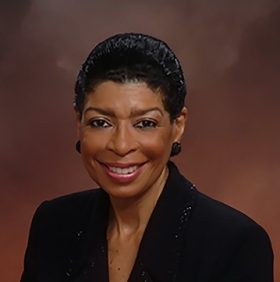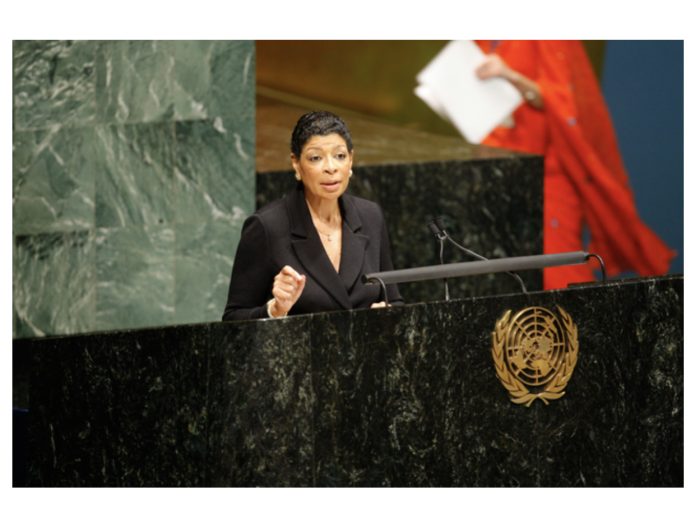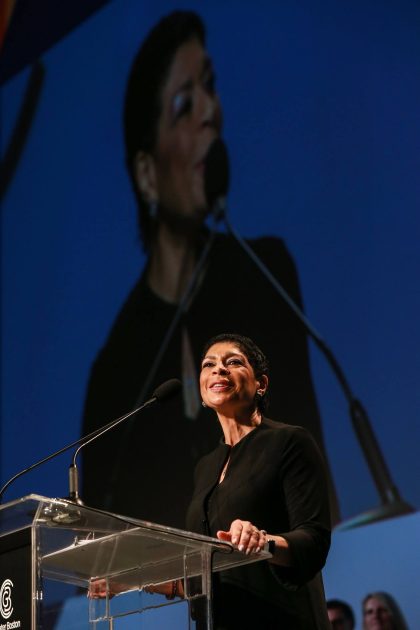In this month’s At the Helm, our Vice President, Diversity, Equity and Inclusion, Guirlaine Belizaire spoke with Carol Fulp, CEO of Fulp Diversity LLC and author of Success Through Diversity: Why the Most Inclusive Companies Will Win. Carol is a consultant and executive coach who collaborates with CEOs to assist in creating cultures where diversity and inclusion thrive. She has provided book forums, diversity consulting and executive coaching services for more than 100 organizations. In the interview, Carol discusses how diversity enables organizations to be more successful and where she sees hope for the future.
Guirlaine: Share with us, please, your path to this point in your career.
 Carol: First, I am a child of the Civil Rights Movement. I had the good fortune of accompanying my parents for the March on Washington, where we heard from Dr. Martin Luther King and so many other leaders. I came of age during the Civil Rights Movement when legalized racial segregation and discrimination were abolished in America. We were able to integrate neighborhoods, schools, universities, industries and more. Doors that had previously been closed were now open. So, for me, diversity and inclusion are a part of my being; they are a part of my soul.
Carol: First, I am a child of the Civil Rights Movement. I had the good fortune of accompanying my parents for the March on Washington, where we heard from Dr. Martin Luther King and so many other leaders. I came of age during the Civil Rights Movement when legalized racial segregation and discrimination were abolished in America. We were able to integrate neighborhoods, schools, universities, industries and more. Doors that had previously been closed were now open. So, for me, diversity and inclusion are a part of my being; they are a part of my soul.
While still much work needs to be achieved to truly ensure equity for all in America, I am so cognizant of the scores of people who came before me who sacrificed and died – to enable us to have a seat at the table. My responsibility is so small compared to what others have done to bring us to where we are today. Still, I view my responsibility as opening doors wider for others. I personally have chosen to help open doors in the business world, as people of difference rarely had access to this environment. While I am passionate about diversity, I focus on the business value of diversity. Diversity and inclusion are good for business. I have seen this evidenced in numerous research studies and throughout my career.
So, when I see what is happening in state governments and civil society across America today – whether it be Tennessee, Missouri, Oklahoma, Florida and on and on—I see the erosion of civil rights and inclusion of all kinds. And like many, I understand how imperative it is to live in an equitable America, a country that values difference of race, gender, sexuality, disability and more. We cannot afford to go back to an inequitable society. That is not good for our democracy nor our economy. As such, my voice lies in articulating the adverse economic impact of inequality, while always advising of the many advantages that diversity and inclusion bring our businesses and society.
I am so appreciating how your life evolved from being at the beginning of the civil rights movement and that opening up opportunities for you to then serve justice through the lens of business. What compelled you to write Success Through Diversity: Why the Most Inclusive Companies Will Win?
I wrote Success Through Diversity: Why the Most Inclusive Companies Will Win because I was at a stage of life where I felt I had something to say. I had lived in the corporate world as Senior Vice President at John Hancock, in the nonprofit professional services world as CEO of the Partnership Inc., and in government and diplomatic service through the appointment by President Barack Obama as U.S. Representative to the United Nations General Assembly.
 Most notably, my global experience at the United Nations truly propelled me to create more ethnically and gender diverse environments. At the UN no matter how large or small a country, everyone mattered, everyone was equal–because every vote counted.
Most notably, my global experience at the United Nations truly propelled me to create more ethnically and gender diverse environments. At the UN no matter how large or small a country, everyone mattered, everyone was equal–because every vote counted.
The mission of the United Nations is to maintain peace. War and violence disproportionately affect women and girls. Consequently, there was a huge investment in women. We see this reflected in then Secretary of State Hillary Clinton’s well-known words, “women’s rights are human’s rights”. Clinton and U.S. Ambassador Susan Rice helped launch UN Women, the global champion for gender equality and women. Women were advocated for each and every day throughout the entire body of the United Nations.
This experience became an incredible center of gravity for me, it demonstrated that equality, inclusion, and shared values can drive the work. This culture enveloped me and I wanted to bring this culture to the corporate world, to further engage in these drivers of success.
When I returned to Boston, I felt I was called to help the city be more reflective of the United Nations—in terms of diversity and culture. I worked to create executive women’s programs in corporate and then moved to become CEO of the Partnership Inc., a leadership development organization for executives and professionals of color. I wrote Success Through Diversity: Why the Most Inclusive Companies Will Win. The book enabled me to share real life diversity success stories of individuals and companies adding a human face to the diversity statistics. It provided me the opportunity to make the case for diversity as a winning proposition. Simply put–you want to hire the best talent of all kinds. If you don’t diversify, you won’t win. After all, diversity and inclusion is the ability to attract and retain the best talent.
Continuing and delving deeper into the book, Carol, please speak more to the competitive edge companies and nonprofits gain from incorporating diversity, equity, and inclusion into their organizational structure.
Diversity always starts at the top. Let’s look at a corporation like Eastern Bank that I profiled in the book. They first focused on board diversity. Chairman & CEO Bob Rivers is an exceptional leader and enabled his board to become 50% diverse–through ethnicity, gender, sexual orientation and more. Eastern Bank’s last Lead Director of the Board, Wendell Knox, is Black and their current Lead Director, college president Deborah Jackson, is a Black woman. Bob’s incredible commitment to diversity has also enabled him to attract Quincy Miller as President and Vice Chair of the Board, who is also Black. That board has in turn assisted the company in realizing its strategies to reach broader communities and marketplaces. Their strong focus on diversity and inclusion, from the board, to the staff, and the growing customer base allows them to authentically undertake challenging issues of equity. For instance, one of the areas Eastern’s Foundation President, Nancy Stager, addresses is economic inclusion. She and her team work with community partners to help dismantle systems of oppression that continue inequities.
In particular, I think of the Black wealth gap–a huge societal challenge manifesting from slavery. In Boston, the average wealth of a white family is $250,000, yet the average wealth of a Black family is $8. This can be hard to believe; however, these figures are similar nationwide. Historically, Blacks have not been able to cultivate and pass down generational wealth given systemic obstacles and racism. This is the kind of issue that Eastern Bank is grappling with, and they can only do so because they have a chairman who wants to address these issues, a board sensitive to and invested in these issues, and a marketplace that says this is good for their community. It all makes good business sense.
On the nonprofit side, I look to the Boston Foundation and Lee Pelton. I and so many were moved by his poignant letter to students after the death of George Floyd, when Lee was president of Emerson College. I was haunted by his words and his experiences, and was so inspired by his call to action, “What are you going to do?” Later, Lee joined the Boston Foundation as CEO & President. After a period of in-depth analysis, the Boston Foundation evolved its core strategies to amplify civic leadership to create opportunity and equity. In his work with the Boston Foundation, Lee has certainly demonstrated “what are you going to do?”
With Lee’s question and the evidence that diversity wins, there are still challenges, obstacles, and fears individually and collectively to truly implement diversity, equity, and inclusion. Can you share a little bit about those fears of doing what on some level we know will be to our advantage. What is the resistance there?
The resistance is based on the fear of losing. It is a reaction by some to the demographic shifts of this country. The U.S. Census Bureau indicates by 2043 there will be more people of color in America than Caucasians. Today, there are more babies of color born than Caucasians, and there are more students of color than Caucasian students. This can be very intimidating to some. It’s important for us to articulate diversity not as a pie, where you are losing pieces as you give them away, but more like a salad where you are adding all of these wonderful ingredients. The variety of different ingredients makes the salad better. We are all better because of diversity. To be clear, diversity is inclusive of white males. I would not want to be in an institution where there are not white males–I would be missing an important ingredient.
So, let us first acknowledge the fear, explore where it is coming from, and explain how inclusion is an advantage to everyone. Let’s reinforce that inclusion is about creating better, more successful businesses, and attracting the best talent of all kinds. But we must also bring the emotional intelligence—empathy and understanding—to the table to help open the conversation about fear as we move forward in this new era.
There is push back surrounding DEI, such as the ongoing divisiveness over the term “woke” and organizations cutting back on DEI departments, given the economic stresses, and you mentioned what happened in Tennessee. Could you delve into how to move past these fears and sensitivities in the business world?
 In terms of the word “woke,” just throw the word out – it has already been misappropriated. Focus instead on what kind of company you want, and how to create an organization that is competitive in today’s environment where everyone is valued.
In terms of the word “woke,” just throw the word out – it has already been misappropriated. Focus instead on what kind of company you want, and how to create an organization that is competitive in today’s environment where everyone is valued.
If you want to attract the best talent, take into consideration the demographics. Of the 5 generations in the workforce, millennials comprise the largest segment and 44% of millennials are people of color. Gen Z is recognized as the most diverse generation yet: 49% are people of color, and in general 7% of all individuals identify as LGBTQ. At the same time, right now there are more women graduating from college than men. This is what the workforce looks like. Creating workplaces where they can succeed is critical. Remember if you don’t, another company will. And they will win.
Is there a place to look at the political?
Business is critical for innovation, imagination and influence. However, we would not be a democracy without the opportunity for our voices and votes to count. To paraphrase former President Barack Obama, movements are always started by our young people. And I am inspired by this next generation of Americans who are today engaging in politics to ensure humanity and equity for all.
Where do you get this hope in the midst of all the noise and pushback we are seeing? Does it come from the young people? Where are you sourcing this hope for the work of diversity equity and inclusion?
My hope is sourced throughout our history. My hope is sourced from this country coming out of slavery, moving through Jim Crow, the Civil Rights Movement, and the election of a president who is Black. My hope also comes from understanding the fears of the shifts in America–and knowing despite these fears, as Dr. Martin Luther King Jr. said, “the arc of the moral universe is long, but it bends toward justice.” And as former Attorney General Eric Holder added, “it only bends towards justice because people pull it.” We are all a part of pulling that arc and I am particularly inspired by the young people in this effort.
Circling back to the beginning of our conversation where we asked you to share a bit about your path: you are the recipient of many awards. I wondered if you might share with us, given the conversation at this point, what recognition was most meaningful to you and why?
Actually, there are two. First, the Museum of African American History Living Legend Award honoring my work with the Obama campaign. This award holds such meaning because it comes from my people for doing whatever I could to help elect the best of our people.
The second is the Greater Boston Chamber of Commerce Distinguished Bostonian Award. This honor reflects that corporate work, my efforts in diversity and inclusion, and indicate that I make a difference, especially in my community.
In closing, what advice would you share with others at the helm, those sitting in a corner office looking at the world and thinking how I might be of use? What would you offer, those who have an opportunity to make a change, to make a difference?
I am always reminded of former Virginia Governor Doug Wilder, the first elected Black governor in the country, and his words to Deval Patrick as he, also a Black man was elected Governor of Massachusetts. Governor Wilder said, “It doesn’t matter if there is a first, unless there is a second.” So many of us are firsts, but that doesn’t matter if we aren’t opening the doors for others to follow.
It is important for us to understand that when success is only focused on you, it dies with you. One is only truly successful when we share and pass on whatever we have. That becomes a legacy that never dies.
So let us pass on our knowledge, our access, our all. In today’s complex world, let us always be reminded of Lee Pelton’s words “What are you going to do?” I add to his question, “What are you called to do?” Continue to ask yourself this question and the answer will find you.


